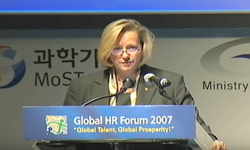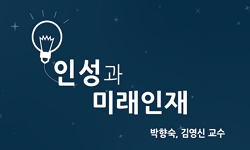本稿에서는 요순의 태평성대를 자신의 治世에 재현시키고자 했던 군주인 정조의 人材觀을 그의 개인 문집인 『弘齋全書』에 수록되어 있는 「策問」을 통해 살펴보았다. 책문은 어려움에 ...
http://chineseinput.net/에서 pinyin(병음)방식으로 중국어를 변환할 수 있습니다.
변환된 중국어를 복사하여 사용하시면 됩니다.
- 中文 을 입력하시려면 zhongwen을 입력하시고 space를누르시면됩니다.
- 北京 을 입력하시려면 beijing을 입력하시고 space를 누르시면 됩니다.

정조(正祖)의 인재관(人材觀) 연구(硏究) -「책문(策問)」을 중심으로- = A study on King Jeongjo`s view of talented people: Focused on 「Chaekmun」
한글로보기부가정보
국문 초록 (Abstract)
本稿에서는 요순의 태평성대를 자신의 治世에 재현시키고자 했던 군주인 정조의 人材觀을 그의 개인 문집인 『弘齋全書』에 수록되어 있는 「策問」을 통해 살펴보았다. 책문은 어려움에 처해 있는 국가의 문제를 소통시킬 수 있도록 과거를 통해 세상에 첫발을 내딛는 젊은 인재들에게 해결책을 구하는 수단이었다. 책문은 당대의 碩學들이 출제하기도 하지만 출제자는 임금이라는 형식을 띤다. 따라서 책문 속에는 그 출제의 주체인 임금의 시대를 보는 관점이 가장 잘 녹아 있다. 그러므로, 論者는 조선 후기 강력한 신권을 억누르고 왕권을 회복함으로써 조선의 약진을 시도했던 정조의 人材觀을 바로 이러한 「策問」을 통해 살펴본 것이다. 정조의 인재관은 크게 둘로 나누어 볼 수 있다. 첫째는 股肱之臣의 人材觀이고, 둘째는 立賢無方의 人事論이다. 이러한 관점을 바탕으로 정조는 다양한 정책들을 시행하였으니, 奎章閣 設置와 抄啓文臣 制度가 첫째이고, 다음으로는 庶孼許通의 實施이고, 끝으로 蕩蕩平平의 展開이다. 정조는 규장각을 설치하여 규장각신과 검서관을 발탁하였는데, 이들은 과거 급제가 부정으로 이루어지고 인사권이 당파와 문벌에 좌우되던 당시의 현실 속에서 완전히 실력만으로 발탁되어 정조의 전폭적인 지지와 후원 속에서 자신들의 역량을 최대한 발휘하였다. 또한 抄啓文臣 制度는 관리들의 재교육 제도로서 형식적인 과거제도를 통해 등용된 관리들의 업무능력을 신장시키고 부정부패를 방지하겠다는 명분으로 실행되었다. 이는 한 번 관리가 되면 안일한 자세로 노력하지 않는 관리들에게 끊임없이 학문에 정진할 것을 독려하기 위한 것이었다. 다음으로 庶孼許通의 實施이다. 정조는 열성조가 현인을 등용함에는 정해진 틀이 없었으나 근래에는 서얼이나 천인은 등용하지 않는 것을 비판하였다. 우리나라는 나라가 작고 인재가 부족함에도 불구하고 서얼이라는 이유로, 또는 천인이라는 이유로 수많은 인재를 잃는 것에 대해 안타까워하며 서얼을 검서관에 임명하는 등 적극적인 인사정책을 펼쳤다. 끝으로 蕩蕩平平의 展開이다. 정조는 기존 집권 붕당을 완전 제거하지 않고 그들의 정치적 주도권만 제거함으로써 점차 각 붕당의 공존을 가능케 하면서 한편으로 노론에서 소론으로, 다시 남인으로 주도권을 순환시켜 어느 붕당의 專制도 허용하지 않음으로써 붕당의 집단성을 서서히 희석시켜 나갔다. 이렇듯 정조는 정치적 안정을 저해하는 붕당간의 갈등을 붕당간의 세력균형과 상호견제를 통해 극복해 나갔다. 물론 궁극적으로는 모든 관료들이 정치의 公的 책임성을 자각하여 붕당의 私的 동기를 스스로 극복하고 서로 진정한 화합을 이루는 것을 목표로 하였다. 이상에서 정조의 人材觀을 그의 策問을 통해 살펴보았다. 책문 속에는 이처럼 정조가 人材를 바라보는 관점과 그에 따라 그가 실천하고 추진하였던 여러 정책들이 어떠한 생각과 의지로 시행되게 되었는지가 고스란히 담겨 있다. 이를 통해 策問은 정치의 주체인 임금의 시대를 바라보는 관점을 살펴볼 수 있는 최상의 근거자료가 됨을 알 수 있다.
다국어 초록 (Multilingual Abstract)
This study examined the view of talented people of King Jeongjo who attempted the realization of the peaceful time under the rule of King Yao and Shun in China during his reign based on 「Chaekmuns」(策問: examination question) in his personal lit...
This study examined the view of talented people of King Jeongjo who attempted the realization of the peaceful time under the rule of King Yao and Shun in China during his reign based on 「Chaekmuns」(策問: examination question) in his personal literary collection 『Hongjeseonseo (弘齋全書)』. Chaekmun was a tool to communicate national problems and to get solutions for the problems from young talented people who were about to take their first step out to the world through the civil service examination. Chaekmun was sometimes made by great scholars but officially it was supposed to be made by the king. Accordingly, Chaekmun reflected best the viewpoint of the king who prepared the question. Therefore, through Chaekmun, this study analyzed the view of talented people of King Jeongjo who attempted the leap of Chosun by suppressing the strong vassal power and restoring royal power during the late Chosun Dynasty. King Jeongjo`s view of talented people can be divided largely into two. One is Gogoeingjisin(股肱之臣: a subject as valuable as the forearm or the thigh) and the other is Iphyeonmubang(立賢無方: appointment of talented people regardless of intimacy and social status). Based on these viewpoints, King Jeongjo executed various policies including the installation of Gyujanggak(奎章閣) and the system of Chogyemunsin(抄啓文臣: civil vassals under education and research programs at Gyujanggak during the late Chosun Dynasty), the acceptance of Seoeolheotong(庶孼許通: demand for the appointment of children by a concubine to government positions), and the employment of Tangtangpyeongpyeong(蕩蕩平平: impartiality in arguments or disputes). King Jeongjo installed Gyujanggak and picked out officials such as Gyujanggaksin(奎章閣臣) and Geomseogwan(檢書官). In those days when the civil service examination was corrupted and its results were influenced by political factions and influential families, these officials were selected purely based on their abilities and displayed their capabilities to the full under King Jeongjo`s full support and patronage. In addition, the Chogyemunsin system was a reeducation system for officials, which was introduced in order to enhance the competence of government officials appointed through the civil service examination and to prevent injustices and corruptions. It was to encourage the officials to keep learning rather than being indolent after appointment. Next, Seoeolheotong was admitted. King Jeongjo criticized that the preceding kings had appointed wise people without any fixed frame, but in his days children by a concubine or from a low family were not appointed. He deplored that although the country was small and the number of talented people was limited, many talented people were lost only because they were children by a concubine or low-class people, and executed active personnel policies by appointing children by a concubine to be Geomseogwan. Lastly, Tangtangpyeongpyeong was employed. King Jeongjo did not remove the existing faction in power but deprived them of their political hegemony. As a result, different factions could coexist and the hegemony was transferred from Noron(老論) to Soron(少論) and again to Namin(南人). In this way, autocracy was not allowed to any faction and factionalism was diluted gradually. Like this, King Jeongjo overcame conflicts among the factions, which disrupted political stability, through power balance and mutual containment among the factions. Of course, his ultimate goal was to make all government officials become aware of their political and public responsibilities, overcome the personal motives of their faction, and reach genuine harmony with one another. As presented above, this study examined King Jeongjo`s view of talented people through his Chaekmun. Chaekmun shows how King Jeongjo viewed talented people and with what ideas and intentions the king practiced and promoted various policies. Through this study, it was found that Chaekmun is the best ground for understanding the views of kings who were the political rulers in their ages.
동일학술지(권/호) 다른 논문
-
투고논문 : 조선(朝鮮) 성종조(成宗朝) 경연(經筵) 진강방법(進講方法)의 현대(現代) 한문과(漢文科) 교육적(敎育的) 활용(活用)
- 근역한문학회
- 송영일 ( Young Il Song )
- 2009
- KCI등재
-
투고논문 : 허균 전(傳)에 나타난 불온(不穩)한 인간상의 문제 -누아르적 세계의 등장과 타자의 서사-
- 근역한문학회
- 윤채근 ( Chae Keun Yoon )
- 2009
- KCI등재
-
- 근역한문학회
- 명평자 ( Pyung Ja Myung )
- 2009
- KCI등재
-
투고논문 : 수업 관찰과 분석을 통한 중학교 한문 교사의 수업 개선 연구
- 근역한문학회
- 김동규 ( Dong Gyu Kim )
- 2009
- KCI등재
분석정보
연관 공개강의(KOCW)
-

규장각과 책의 문화사
K-MOOC 서울대학교 한국경제와 K학술확산 연구센터 황재문, 박현순, 조계영, 노관범, 정준영, 정호훈, 정요근, 권기석 -

글로벌 인재포럼 2007: HR 글로벌 인재 시장의 트렌드
글로벌 인재포럼 David Arkless(Manpower Inc), Reiji Ohtaki(Hay Group Asia), Adele M. Yeargen(Hewitt Associates) -

규장각과 책의 문화사
K-MOOC 서울대학교 한국경제와 K학술확산 연구센터 황재문, 박현순, 조계영, 노관범, 정준영, 정호훈, 정요근, 권기석 -

인성과미래인재
서울신학대학교 박향숙(Park, Hyangsook), 김영신(Kim, Yongshin) -

글로벌 인재포럼 2007: 미래 핵심 과학기술 인력 육성과 활용 전략
글로벌 인재포럼 Luc Soete, Director, Sung-MoSteveKang, Chancellor, Yrj Sotamaa, President




 KCI
KCI KISS
KISS

